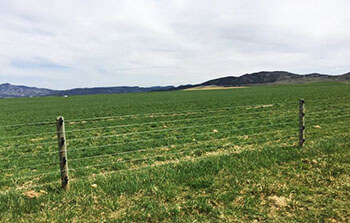Quality construction leads to durable, useful electric fences
Jul 29, 2019

Before beginning construction of an electric fence, sketch out your project and choose your products carefully to ensure the fewest possible problems. Pair the correct fence energizer to the size of the fence you’re constructing. The key to a hot fence is correct grounding — use at least three 6-foot galvanized ground rods spaced 10 feet apart.
For most temporary uses, a thin metal wire (14-gauge) designed specifically for electric fencing is a good choice. Poly wire, made of ultraviolet-stabilized, high-density polyethylene fibers and stainless steel conductors, is an alternative that’s easy to work with, weather resistant, lightweight, and highly visible. Both types are portable, can be reused, and require little maintenance.
For posts, choose plastic step-in or rebar posts. The step-in posts are self-insulating, while the rebar posts will require a screw-on insulator.
Permanent fences, on the other hand, should be considerably stronger. Strength doesn’t need to equal that of a woven fence due to the electric current doing most of the work, but it should be a product that is durable.
High-tensile wire is a sensible option. Choose at least a 12½-gauge wire because it will conduct electricity over a much greater distance than a similar, smaller gauge wire. Its thicker diameter can also handle the much greater tension that comes with high-tensile construction.
With high-tensile wire, it’s very important to brace your corner posts well so you can stretch your fence good and tight. Choose solid, treated wooden posts and install them at a depth of 2 to 3 feet to provide a good anchor point.
Since everyone has different needs, the fence that works for your neighbor may not work for you. For advice on building fences, whether temporary or permanent, visit the friendly professionals at your local Co-op.
For most temporary uses, a thin metal wire (14-gauge) designed specifically for electric fencing is a good choice. Poly wire, made of ultraviolet-stabilized, high-density polyethylene fibers and stainless steel conductors, is an alternative that’s easy to work with, weather resistant, lightweight, and highly visible. Both types are portable, can be reused, and require little maintenance.
For posts, choose plastic step-in or rebar posts. The step-in posts are self-insulating, while the rebar posts will require a screw-on insulator.
Permanent fences, on the other hand, should be considerably stronger. Strength doesn’t need to equal that of a woven fence due to the electric current doing most of the work, but it should be a product that is durable.
High-tensile wire is a sensible option. Choose at least a 12½-gauge wire because it will conduct electricity over a much greater distance than a similar, smaller gauge wire. Its thicker diameter can also handle the much greater tension that comes with high-tensile construction.
With high-tensile wire, it’s very important to brace your corner posts well so you can stretch your fence good and tight. Choose solid, treated wooden posts and install them at a depth of 2 to 3 feet to provide a good anchor point.
Since everyone has different needs, the fence that works for your neighbor may not work for you. For advice on building fences, whether temporary or permanent, visit the friendly professionals at your local Co-op.